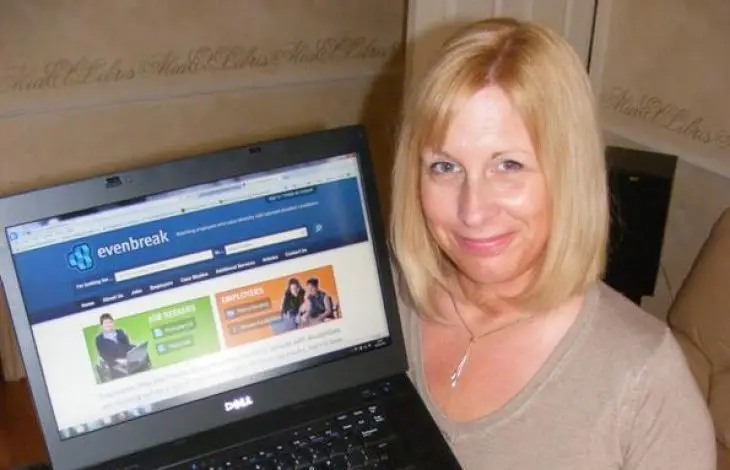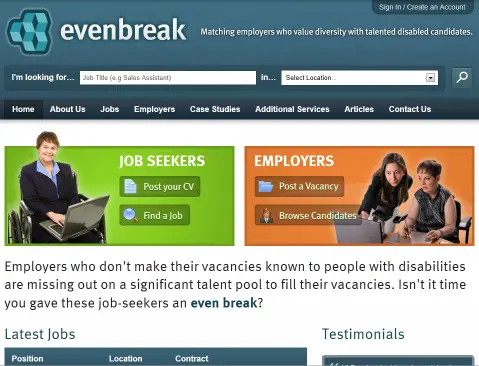
A tale of fate, irony and happy endings
New DH contributor, Jane Hatton, a finalist of the Stelios Disabled Entrepreneurs Award in 2008, founded and runs Evenbreak, a not-for-profit specialist job board for disabled job seekers. Jane shares her story about how she created Evenbreak.
Life has a very quirky sense of irony sometimes. I’m not sure what I had planned for my future, but it almost certainly didn’t involve going from being a non-disabled person advising employers on why they should employ disabled people, to being a disabled person running a non-profit job board helping other disabled people find work.
I’ll back-track a bit. I was always interested in diversity – what makes us all unique, learning about people unlike me and the richness that difference can bring to our lives, our businesses and the world generally. Following a career in social work, I became a Diversity Consultant, travelling all over the country talking to employers about the benefits of a diverse workforce. Non-disabled myself, I worked with many disabled employee groups, and was always amazed that such talented people tended to be clustered in the low paid, low status jobs (if they were “lucky” enough to have jobs at all). I would urge employers to look past people’s disabilities, and value what they had to offer.
And then suddenly, in the first ironic twist of fate, I became disabled myself. A spinal condition meant I could no longer drive up and down the country to deliver training, or even stand or sit long enough even if I could get there. I had to do to myself what I had been urging employers to do for the past fourteen years – look past my own disability to see what I had to offer. Eventually I started a training business, employing other people to deliver the training. Wanting to practice what I had been preaching for so long, I was able to discover firsthand the benefits of working with a hugely diverse team (five office staff and 40 trainers, including both genders, a range of ethnic backgrounds, a number of different disabilities and various cultures, ages, religions and sexual orientation).
Then fate raised its head once again, in the form of a ridiculously expensive (£40,000!), experimental and risky operation which I undertook hoping it would help. Sadly, it went disastrously wrong, leaving me much poorer, and also significantly more disabled. Forced to lie flat for at least 22 hours a day, unable to sit at a desk, I continued to run the business lying on a platform with a lap top suspended above me.
 At this time, another business idea was slowly forming. One of the themes that cropped up time and time again when I or my trainers were talking to employers about disability was that many said they really did understand the benefits of employing disabled people, but struggled to attract disabled applicants when they advertised jobs. Some of our shareholders also echoed this problem. I had joined many forums for disabled people, and raised this question. I was told that disabled job seekers were sick and tired of constantly having their application rejected the minute they declared their disability. It seemed that these two groups – genuinely inclusive employers and disabled job seekers – needed help to find each other.
At this time, another business idea was slowly forming. One of the themes that cropped up time and time again when I or my trainers were talking to employers about disability was that many said they really did understand the benefits of employing disabled people, but struggled to attract disabled applicants when they advertised jobs. Some of our shareholders also echoed this problem. I had joined many forums for disabled people, and raised this question. I was told that disabled job seekers were sick and tired of constantly having their application rejected the minute they declared their disability. It seemed that these two groups – genuinely inclusive employers and disabled job seekers – needed help to find each other.
With help and advice from friends and colleagues, I formed Evenbreak. Evenbreak is a not-for-profit specialist job board for disabled job seekers. Disabled people can register then upload their CV and search for jobs, confident that the kind of employer who advertises on a site specifically for disabled people is likely to take their application seriously, looking beyond their disabilities. Inclusive employers can be confident in attracting additional disabled candidates to the talent pool they choose from.
Although Evenbreak is still very new (we went live in March 2011) we have already helped disabled people find work – some of whom thought they might never work again.
I spend nearly all my time running Evenbreak now. With the advent of technology it is perfectly possible to run a business lying down! I can use email and telephone for communicating with people, and social media for marketing. With a driver transporting me lying flat I can get to meetings and conferences, and on a good day can stand for up to an hour with a back brace and crutches when I get there.
The irony is that having spent twenty years telling employers that disabled people make good employees I had to put my money where my mouth was and prove it. And Evenbreak is proving it – with every talented disabled person who finds a job with an inclusive employer.
By Jane Hatton
You can find out more about Jane Hatton and Evenbreak, please click here.
Jane, you are a very inspirational person. Many a stronger person would have given up and instead you turn it around to help others. Well done.
Thank you Sarah. I really don’t feel it’s inspirational, it’s more a combination of feeling very strongly about something (and I felt strongly about disabled people being valued in the workplace long before i became disabled myself) and sheer stubborness and bloody-mindedness!
I draw inspiration from many people, disabled and non-disabled (you are one of them), but I actually think that most of us just do what we can with what we’ve got. And even that can sometimes produce amazing results.